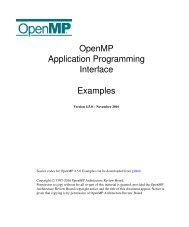D2 3 Computing e-Infrastructure cost calculations and business _models_vam1-final
D2 3 Computing e-Infrastructure cost calculations and business _models_vam1-final
D2 3 Computing e-Infrastructure cost calculations and business _models_vam1-final
You also want an ePaper? Increase the reach of your titles
YUMPU automatically turns print PDFs into web optimized ePapers that Google loves.
e-‐FISCAL: www.efiscal.eu <br />
EC Contract Number: 283449 <br />
1.4 Terms <strong>and</strong> definitions<br />
Capital Expenditures (CAPEX) <br />
Cloud computing <br />
Central Processing Unit (CPU) <br />
EGI – European Grid <br />
<strong>Infrastructure</strong> <br />
EGI.eu 12<br />
Full Cost Accounting (FCA) <br />
HPC-‐ High Performance <br />
<strong>Computing</strong> <br />
HTC -‐ High Throughput <br />
<strong>Computing</strong> <br />
Hyper-‐threading <br />
Capital Expenditures are <strong>cost</strong>s incurred in order to create future benefits. This <br />
<strong>cost</strong> is accounted for during the periods the assets are economically used through <br />
depreciation. <br />
Cloud computing is a model for enabling ubiquitous, convenient, on-‐dem<strong>and</strong> <br />
network access to a shared pool of configurable computing resources (e.g., <br />
networks, servers, storage, applications, <strong>and</strong> services) that can be rapidly <br />
provisioned <strong>and</strong> released with minimal management effort or service provider <br />
interaction. <br />
A central processing unit (CPU), also referred to as a central processor unit, is the <br />
hardware within a computer that carries out the instructions of a computer <br />
program by performing the basic arithmetical, logical, <strong>and</strong> input/output <br />
operations of the system. <br />
A federation of shared computing, storage <strong>and</strong> data resources from national <strong>and</strong> <br />
intergovernmental resource providers that delivers sustainable, integrated <strong>and</strong> <br />
secure distributed computing services to European researchers <strong>and</strong> their <br />
international partners. <br />
A non-‐profit organisation based in Amsterdam established to coordinate <strong>and</strong> <br />
manage the infrastructure (EGI) on behalf of its participants: National Grid <br />
Initiatives (NGIs) <strong>and</strong> European Intergovernmental Research Organisations <br />
(EIROs). <br />
Full Cost Accounting is a typical <strong>cost</strong>ing methodology within which detailed actual <br />
data (in line item format) is attributed <strong>and</strong> allocated on the basis of specific <br />
algorithms <strong>and</strong> various <strong>cost</strong>ing procedures to services/products in order to come <br />
up with the “<strong>cost</strong> per unit” of the object being analysed. <br />
HPC is a computing paradigm that focuses on the efficient execution of compute <br />
intensive, tightly-‐coupled tasks. Given the high parallel communication <br />
requirements, the tasks are typically executed on low latency interconnects which <br />
makes it possible to share data very rapidly between a large numbers of <br />
processors working on the same problem. HPC systems are delivered through low <br />
latency clusters <strong>and</strong> supercomputers <strong>and</strong> are typically optimised to maximise the <br />
number of operations per seconds. The typical metrics are FLOPS, tasks/s, I/O <br />
rates. <br />
HTC is a computing paradigm that focuses on the efficient execution of a large <br />
number of loosely-‐coupled tasks. Given the minimal parallel communication <br />
requirements, the tasks can be executed on clusters or physically distributed <br />
resources using grid technologies. HTC systems are typically optimised to <br />
maximise the throughput over a long period of time <strong>and</strong> a typical metric is jobs <br />
per month or year. <br />
Hyper-‐threading (officially Hyper-‐Threading Technology or HT Technology, <br />
abbreviated HTT or HT) is Intel's term for its simultaneous multithreading <br />
12 http://www.egi.eu/ <br />
e-‐FISCAL : Financial Study for Sustainable <strong>Computing</strong> e-‐<strong>Infrastructure</strong>s <br />
Deliverable <strong>D2</strong>.3 – <strong>Computing</strong> e-‐<strong>Infrastructure</strong>s <strong>cost</strong> estimation <strong>and</strong> analysis – Pricing <strong>and</strong> <br />
Business <strong>models</strong> <br />
19




